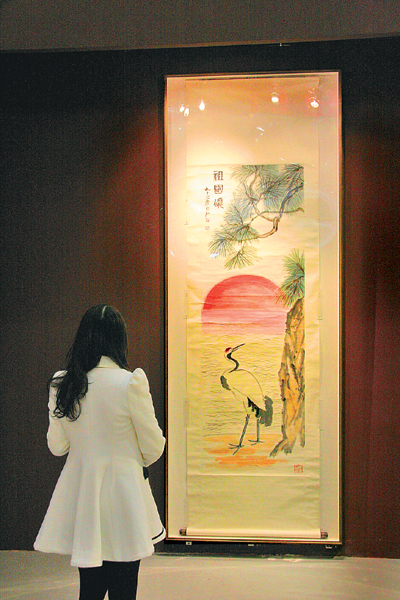Art market chills in spring
Updated: 2013-03-29 08:15
By Zhang Yuchen (China Daily)
|
||||||||
'The right to follow'
|
 |
|
A woman examines a painting by Qi Baishi at last year's Beijing Poly autumn auction. Provided to China Daily |
The implementation of Droit de suite in China would allow artists, and their descendants in some cases, to profit from the resale of their works. In most countries where the rule is used, artists benefit to the tune of around 1 to 5 percent.
The proposal has caused a wave of unease among auctioneers who say the imposition of the resale levy will stifle the market. However, the authorities point to the fact that it would prevent the resale of a large number of fakes and push the nation's art market higher up the value chain
In Europe, the system is used to fix the amount paid to the artists as a percentage of the profit accrued by the reseller and not the whole value of the sale, irrespective of whether or not the deal is made through an auctioneer, according to Liu Shuangzhou, a professor at the law school at the Central University of Finance and Economics.
However, the proposal presented to the Chinese authorities calls for the charge to be payable only by auctioneers and not individuals who sell directly from their own collections. It's that aspect of the move that's prompted the dissatisfaction among the auctioneers.
"It is difficult to decide if it's a good way to protect artists and their rights, not to mention the effect it could have on the market and investors," said Liu Shuangzhou. "Experienced collectors will probably only part with really treasured pieces when they become 'must-sell' items."
"An extra payment, especially when its seems like a punishment, will make investors and artists leave the market," said Gan Xuejun, president and chairman of Beijing Huachen Auctions Co.
The lack of general investment options in China is adding fuel to the fire and leaving those with expendable capital with fewer opportunities to put their money in the pool, said Guan Yu. Usually, investors buy and sell paintings and other art works as a means of managing and increasing their wealth, rather than collecting works purely for their aesthetic value.
In coming years, auctioneers should put more effort into raising investors' awareness of artistic value instead of just concentrating on financial gain, said experts.
Contact the writer at zhangyuchen@chinadaily.com.cn
Yang Wanli contributed to this story.

 Li Na on Time cover, makes influential 100 list
Li Na on Time cover, makes influential 100 list
 FBI releases photos of 2 Boston bombings suspects
FBI releases photos of 2 Boston bombings suspects
 World's wackiest hairstyles
World's wackiest hairstyles
 Sandstorms strike Northwest China
Sandstorms strike Northwest China
 Never-seen photos of Madonna on display
Never-seen photos of Madonna on display
 H7N9 outbreak linked to waterfowl migration
H7N9 outbreak linked to waterfowl migration
 Dozens feared dead in Texas plant blast
Dozens feared dead in Texas plant blast
 Venezuelan court rules out manual votes counting
Venezuelan court rules out manual votes counting
Most Viewed
Editor's Picks

|

|

|

|

|

|
Today's Top News
Boston bombing suspect reported cornered on boat
7.0-magnitude quake hits Sichuan
Cross-talk artist helps to spread the word
'Green' awareness levels drop in Beijing
Palace Museum spruces up
First couple on Time's list of most influential
H7N9 flu transmission studied
Trading channels 'need to broaden'
US Weekly

|

|







